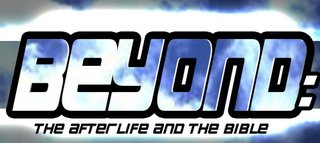Beyond - Part 3 - Hell: Paradise Lost
 Steve's "Beyond" series has been especially good for me, including today's Part 3, Hell: Paradise Lost. While I don't know exactly what hell is, what I do know is very clear: I don't want to find out.
Steve's "Beyond" series has been especially good for me, including today's Part 3, Hell: Paradise Lost. While I don't know exactly what hell is, what I do know is very clear: I don't want to find out.
On the drive home after second service, K-Love was playing "Breakfast in Hell" by the Newsboys. Here are the chorus lyrics:
When the toast is burned
And all the milk has turned
And Captain Crunch is waving farewell
When the big one finds you
May this song remind you
That they don't serve breakfast in hell
And there you go. Reasons enough. I'm useless without my generic cocoa pebbles. They probably don't serve good coffee either. Instant. Weak. And if there's cream, it's that powder stuff that's all soy and oily. Bleh.
Here is Steve's study guide for this week:
Monday: Numbers 16:28-33. The common Hebrew word in the Old Testament for the place of the dead is Sheol (vs. 30, 33), viewed as a place where all the dead went, the righteous and wicked alike. The King James Version 400 years ago usually translated Sheol as “hell,” which was inaccurate and misleading. Translations today may render it “the realm of the dead” or simply “the grave.” This passage portrays how Sheol was conceived as being literally down into the earth. While Israel is wandering in the wilderness, a man named Korah and his allies incite a rebellion against Moses and his brother Aaron. God punishes Korah and company by having the earth open up and swallow them, taking them directly to Sheol.
Tuesday: Ezekiel 32:17-32. Ezekiel, a prophet in the early 6th century BC during Judah’s exile in Babylon, gives a series of oracles against the nations in chapters 25-32, depicting “God’s judgment against all empires that strut the earth claiming divine status” (The New Interpreter’s Study Bible). This one portrays Egypt descending into Sheol (vs. 21, 27), meeting other military powers who have come and gone before. They all end up dead. This message inspires hope among the Jews in exile. Here we find the emerging belief that there may be varying levels in the place of the dead. In v. 23 it says of the previous superpower Assyria, “Their graves are set in the uttermost parts of the Pit” (NRSV).
Wednesday: Luke 16:19-31. The Old Testament Hebrew word Sheol was translated into Greek as Hades, originally the name of the Greek god of the underworld. In the New Testament however, Hades often simply means death. For example, in Matthew 16:18, when Jesus says to Peter, “On this rock I will build my church, and the gates of Hades will not prevail against it (NRSV), the likely meaning is that death will not be able to hold his people. However, in this parable in Luke 16, Hades seems to be a place of fiery torment, separated from Lazarus’ position at Abraham’s side. One must be cautious about assuming everything in such a story is meant to be factual, much as we would not assume a story today about conversing with St. Peter at the pearly gates is meant to be a factual understanding of heaven.
Thursday: Matthew 10:5-28. Jesus gives his chosen Twelve instructions before sending them out to proclaim God’s kingdom, and he forewarns them how bad it’s going to be. They will be dragged to court, flogged in synagogues, betrayed by their families, hated by many, constantly on the run, and labeled demonic. But don’t worry about people; they can only kill you. The big mistake would be to disregard God, who has the power to “destroy both soul and body in hell” (v. 28). The Greek word translated hell is Gehenna, which in Jesus’ day was literally a burning trash heap outside Jerusalem. However, the term was also used for the place of punishment in the afterlife. This is one of the scriptures that point to the possibility that those who are not in heaven may not live eternally in hell but their souls may at some point be extinguished.
Friday: Matthew 8:5-13. In v. 12 Jesus uses a term that, among the four gospels, we find only in Matthew, “the outer darkness.” The other occurrences are in 22:13 and 25:30. Rather than being a fiery place, this term connotes emptiness and isolation as well as darkness, in contrast with the light and fellowship of heaven. Weeping and gnashing of teeth emphasizes not pain but great remorse and regret.
Memory verse for the week: “The Lord is not slow in keeping his promise, as some understand slowness. Instead he is patient with you, not wanting anyone to perish, but everyone to come to repentance (2 Peter 3:9, TNIV).
Next week: Part 4, Eternity: Resurrection vs. Reincarnation

0 Comments:
Post a Comment
<< Home